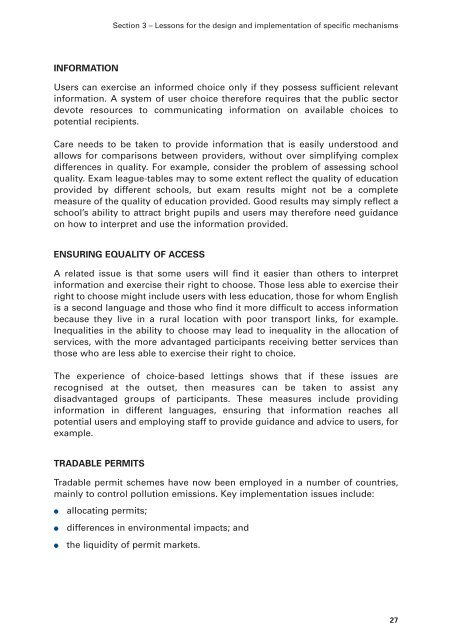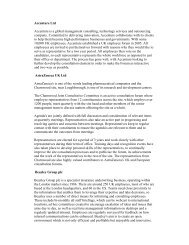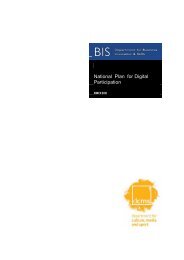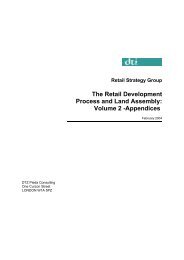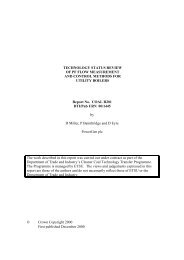Public Policy: Using Market-Based Approaches - Department for ...
Public Policy: Using Market-Based Approaches - Department for ...
Public Policy: Using Market-Based Approaches - Department for ...
You also want an ePaper? Increase the reach of your titles
YUMPU automatically turns print PDFs into web optimized ePapers that Google loves.
INFORMATION<br />
Users can exercise an in<strong>for</strong>med choice only if they possess sufficient relevant<br />
in<strong>for</strong>mation. A system of user choice there<strong>for</strong>e requires that the public sector<br />
devote resources to communicating in<strong>for</strong>mation on available choices to<br />
potential recipients.<br />
Care needs to be taken to provide in<strong>for</strong>mation that is easily understood and<br />
allows <strong>for</strong> comparisons between providers, without over simplifying complex<br />
differences in quality. For example, consider the problem of assessing school<br />
quality. Exam league-tables may to some extent reflect the quality of education<br />
provided by different schools, but exam results might not be a complete<br />
measure of the quality of education provided. Good results may simply reflect a<br />
school’s ability to attract bright pupils and users may there<strong>for</strong>e need guidance<br />
on how to interpret and use the in<strong>for</strong>mation provided.<br />
ENSURING EQUALITY OF ACCESS<br />
A related issue is that some users will find it easier than others to interpret<br />
in<strong>for</strong>mation and exercise their right to choose. Those less able to exercise their<br />
right to choose might include users with less education, those <strong>for</strong> whom English<br />
is a second language and those who find it more difficult to access in<strong>for</strong>mation<br />
because they live in a rural location with poor transport links, <strong>for</strong> example.<br />
Inequalities in the ability to choose may lead to inequality in the allocation of<br />
services, with the more advantaged participants receiving better services than<br />
those who are less able to exercise their right to choice.<br />
The experience of choice-based lettings shows that if these issues are<br />
recognised at the outset, then measures can be taken to assist any<br />
disadvantaged groups of participants. These measures include providing<br />
in<strong>for</strong>mation in different languages, ensuring that in<strong>for</strong>mation reaches all<br />
potential users and employing staff to provide guidance and advice to users, <strong>for</strong><br />
example.<br />
TRADABLE PERMITS<br />
Tradable permit schemes have now been employed in a number of countries,<br />
mainly to control pollution emissions. Key implementation issues include:<br />
● allocating permits;<br />
Section 3 – Lessons <strong>for</strong> the design and implementation of specific mechanisms<br />
● differences in environmental impacts; and<br />
● the liquidity of permit markets.<br />
27


